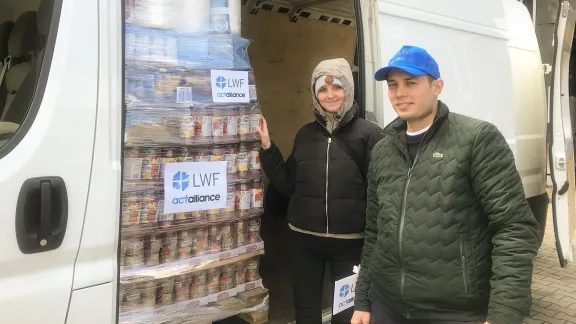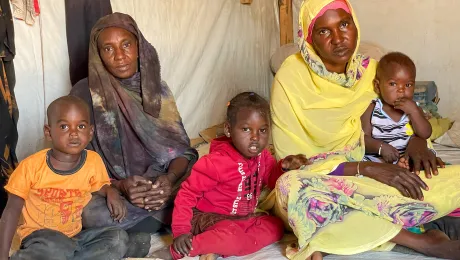
LWF humanitarian support officer Katerina Brzicova and Samuel Reslour, a volunteer, assist in transporting relief items to a warehouse of the Polish Humanitarian Action (PAH), which is partnering with the LWF to distribute food and non-food items to refugees fleeing from Ukraine at the Zosin and Dohoruth borders. Photo: B. Khanal
Priorities include humanitarian work and supporting member churches on front lines of welcome for refugees
(LWI) - The Lutheran World Federation (LWF) is scaling up its response to the war in Ukraine, setting up a team to coordinate both the humanitarian work and support to its member churches in the region. Following meetings with five churches in neighboring countries, LWF is in the process of opening an office in the Polish capital, Warsaw, with the goal of establishing an operating base inside Ukraine as well.
The coordinating team will be led by longtime humanitarian worker Josef Pfattner, who has headed LWF’s emergency responses in countries including Jordan, South Sudan, Chad and the Central African Republic. He will be working alongside Rebekka Meissner who serves as LWF’s Program Executive for Member Church Projects. Meissner recently returned from a fact-finding mission to Romania, Slovakia, Hungary and Poland, while Pfattner also travelled to Budapest to witness firsthand the response to the refugee crisis in that country.

Offloading food and non-food items for refugees who have fled Ukraine, at the Zosin border, on 8 April: In coordination with PAH, the LWF delivered 3.5 metric tons of food for 50 households and 1.3 metric tons of baby comfort kits for 1,500 children, estimated to last one month. Photo: LWF/B. Khanal
“It is impressive to see what the church [in Hungary] is doing with limited resources,” Pfattner said. “There is so much passion, commitment and positive energy in what they are able to provide, including shelter for refugees, food, transport, translation services, medical support and more. The church is stretched, but it is incredible to witness what the Spirit is doing through these people who are committed to helping those most in need,” he added.
Pastoral care and theological reflection
The capacity of local churches to continue responding to the needs of the refugees varies significantly from one country to another, Pfattner explained, so a key challenge will be to provide support for congregations and diaconal organizations already on the front lines of the crisis. United Nations High Commissioner for Refugees figures show that over 4.9 million refugees have fled from Ukraine, while another 7 million remain internally displaced by the fighting.
Meissner stressed the importance of providing pastoral care and support for congregations and church workers who have been leading the response in the region since 24 February, when the first refugees arrived following Russia’s assault on Ukraine. “Churches are living up to their calling to be places of welcome and solidarity for their neighbors in need,” she said. “But the situation is complex and constantly shifting, with ever changing needs, thus requiring a high degree of adaptability on our part,” she added.
Churches are living up to their calling to be places of welcome and solidarity for their neighbors in need. But the situation is complex and constantly shifting, with ever changing needs, thus requiring a high degree of adaptability on our part.
Meissner also highlighted the need for humanitarian actors to reflect on “the difficult questions in regards to neutrality and how to respond from a humanitarian perspective without taking sides in the conflict. For churches especially, shared theological reflection is also needed, she said, “since we are finding ourselves in a radically changed Europe, where previous certainties about peace and just responses to war are being challenged.”
Alongside the practical humanitarian response and support to member churches, the LWF will also continue to coordinate advocacy efforts to bring the voice of the local churches to the global stage. Even when the war is over, there will be much work to be done, both to rebuild houses and infrastructure, but also to repair relationships at local and international levels, he concluded.

LWF and PAH staff stationed at the Dohoruth border town. Photo: LWF/B. Khanal
LWF/P. Hitchen
LWF is coordinating a response through its member churches in Ukraine and the neighboring countries to ensure support to refugees fleeing Ukraine as well as their safe and dignified arrival. The work is supported by LWF's funding partners, including the Evangelical Lutheran Church in America.


